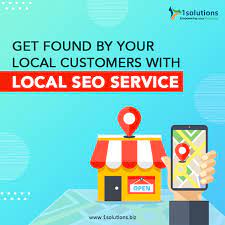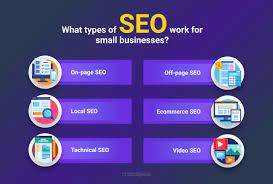Deciphering Local SEO Pricing: A Guide for UK Businesses
The Guide to Local SEO Pricing
Local SEO is essential for businesses looking to attract customers in their specific geographic area. It involves optimising your online presence to increase visibility in local search results. One crucial aspect of local SEO is understanding the pricing structure involved in implementing these strategies.
Factors Influencing Local SEO Pricing
Several factors influence the pricing of local SEO services:
- Scope of Services: The extent of services offered, such as local keyword research, on-page optimisation, Google My Business setup, and local link building, can impact pricing.
- Competitive Landscape: The level of competition in your industry and location can affect the amount of work required to rank higher in local searches.
- Business Goals: Your specific business goals and objectives will determine the strategies needed for effective local SEO, which can influence pricing.
- Geographic Area: The size and competitiveness of your target geographic area play a role in determining the complexity and cost of local SEO campaigns.
- Agency Expertise: The experience and expertise of the agency or consultant providing local SEO services will also impact pricing.
Average Costs of Local SEO Services
The pricing for local SEO services can vary based on the factors mentioned above. On average, businesses can expect to pay between £300 to £2000 per month for comprehensive local SEO services. This range accounts for variations in scope, competition levels, and geographic targets.
Benefits of Investing in Local SEO
While the costs associated with local SEO may vary, investing in these services can yield significant benefits for your business:
- Increase Visibility: Improve your visibility in local search results, making it easier for potential customers to find you online.
- Drive Qualified Traffic: Attract relevant traffic from users actively searching for products or services you offer within your locality.
- Better Conversion Rates: Targeting a local audience increases the likelihood of converting leads into customers due to proximity and relevance.
- Bolster Online Reputation: Strengthen your online reputation through positive reviews and accurate business information across various platforms.
In Conclusion
Pricing is an important consideration when investing in local SEO services. By understanding the factors influencing costs and the potential benefits that come with effective implementation, businesses can make informed decisions about their digital marketing strategies. Partnering with a reputable agency or consultant can help navigate the complexities of local SEO pricing while maximising returns on investment.
Understanding Local SEO Pricing: Answers to 23 Common Questions
- What is a reasonable price for SEO?
- How much should I pay someone for SEO?
- How much does a local SEO cost?
- How much should monthly SEO cost?
- Is SEO low cost?
- How much does SEO cost in 2022?
- How much do freelancers charge for SEO?
- Is it worth paying for Local SEO optimization?
- How much should a small business pay for SEO?
- What is standard SEO charges?
- Is local SEO worth it?
- How much do you charge for SEO services?
- How much does SEO cost per month?
- How much does SEO local cost?
- How much do I charge for SEO?
- How much does Local SEO cost?
- How much does SEO cost per hour?
- How much should I charge for local SEO services?
- How do you price SEO?
- How much does SEO cost 2022?
- Is Local SEO free?
- How much do I charge for SEO work?
- How much does SEO cost for a small business?
What is a reasonable price for SEO?
When considering the question “What is a reasonable price for SEO?” in the context of local SEO pricing, it’s essential to understand that the cost can vary depending on several factors. For local SEO services, a reasonable price typically ranges from £300 to £2000 per month, taking into account the scope of services required, the competitiveness of the market, and the specific goals of the business. It’s crucial for businesses to invest in local SEO strategies that align with their objectives and budget while ensuring they receive quality services that deliver tangible results in terms of increased online visibility and customer engagement within their target geographic area.
How much should I pay someone for SEO?
When considering how much to pay someone for SEO services, it’s essential to understand that pricing can vary depending on several factors. The cost of SEO services is influenced by the scope of work required, the level of competition in your industry and location, the expertise of the SEO provider, and your specific business goals. Typically, businesses can expect to pay a monthly retainer ranging from £300 to £2000 for comprehensive SEO services. It’s crucial to invest in quality SEO services that align with your business objectives and budget to achieve sustainable results in improving your online visibility and driving organic traffic to your website.
How much does a local SEO cost?
When it comes to the frequently asked question, “How much does local SEO cost?” the answer can vary depending on several factors. The cost of local SEO services is influenced by the scope of work required, the competitiveness of the target market, specific business goals, geographic area, and the expertise of the agency or consultant providing the services. On average, businesses can expect to invest between £300 to £2000 per month for comprehensive local SEO strategies. Understanding these factors and considering the potential benefits of investing in local SEO can help businesses make informed decisions about their digital marketing budget and strategies.
How much should monthly SEO cost?
When considering the monthly cost of SEO services, it is essential to understand that pricing can vary based on several factors. The cost of monthly SEO services depends on the scope of work required, the competitiveness of the industry and target keywords, the geographic area being targeted, and the level of expertise of the SEO provider. Typically, businesses can expect to pay between £300 to £2000 per month for comprehensive SEO services. It is crucial for businesses to evaluate their specific needs and goals to determine an appropriate budget for monthly SEO expenses that align with their objectives and expected outcomes.
Is SEO low cost?
When considering local SEO pricing, one common question that arises is, “Is SEO low cost?” The answer to this question depends on various factors. While SEO can be a cost-effective marketing strategy in the long run compared to traditional advertising methods, it is not necessarily low cost upfront. The pricing of SEO services, including local SEO, is influenced by the scope of work required, the competitiveness of the industry and location, and the expertise of the agency or consultant providing the services. Investing in SEO is an essential aspect of digital marketing for businesses looking to improve their online visibility and attract targeted traffic, but it is important to understand that quality SEO services come at a reasonable cost that reflects the value they provide in enhancing your online presence and driving business growth.
How much does SEO cost in 2022?
In 2022, the cost of SEO services, particularly for local SEO, can vary depending on several factors. The pricing for local SEO in 2022 is influenced by elements such as the scope of services required, the competitiveness of the target market, the specific goals of the business, and the expertise of the SEO provider. Businesses looking to invest in local SEO should consider these factors when determining the cost. While average monthly costs for local SEO services may range from £300 to £2000 in 2022, it is essential to remember that tailored strategies and quality service delivery can lead to significant returns on investment through improved online visibility and increased customer engagement within a specific geographic area.
How much do freelancers charge for SEO?
When it comes to freelancers offering SEO services, the pricing can vary depending on several factors. Freelancers typically charge based on their level of expertise, the scope of services provided, and the complexity of the project. Rates for SEO freelancers can range from hourly fees to monthly retainers. Some freelancers may offer package deals for specific SEO services, while others may customise pricing based on the client’s needs and budget. It’s essential for businesses seeking SEO assistance from freelancers to discuss pricing upfront and ensure that both parties are clear on expectations to achieve desired results within a reasonable budget.
Is it worth paying for Local SEO optimization?
When considering whether it is worth paying for Local SEO optimisation, businesses should weigh the potential benefits against the associated costs. Investing in Local SEO can significantly enhance a company’s online visibility within its target geographic area, making it easier for local customers to find and engage with their products or services. By improving search engine rankings and attracting qualified local traffic, businesses can increase their chances of converting leads into customers. While there is a cost involved in implementing Local SEO strategies, the long-term benefits of enhanced visibility, higher conversion rates, and improved online reputation often outweigh the initial investment. Ultimately, businesses that prioritise reaching their local audience and establishing a strong online presence are likely to find value in paying for Local SEO optimisation services.
How much should a small business pay for SEO?
When it comes to determining how much a small business should pay for SEO services, several factors come into play. The cost of SEO for a small business can vary depending on the scope of services required, the competitiveness of the industry and market, the specific goals of the business, and the expertise of the SEO provider. Typically, small businesses can expect to invest anywhere from £500 to £1500 per month in SEO services. It is crucial for small businesses to consider their budget constraints alongside the potential return on investment that effective SEO can bring in terms of increased website traffic, leads generation, and overall online visibility. By working with a reputable SEO agency that offers tailored solutions within a reasonable price range, small businesses can achieve sustainable growth and success in the digital landscape.
What is standard SEO charges?
When it comes to standard SEO charges, the pricing can vary depending on several factors such as the scope of services, competition levels, geographic targets, and agency expertise. There is no one-size-fits-all answer to this question as each business’s SEO needs are unique. Typically, businesses can expect to pay between £300 to £2000 per month for comprehensive SEO services. It is important to consider the value that tailored SEO strategies can bring in terms of increased online visibility, targeted traffic, and improved conversion rates. Partnering with a reputable agency that understands your specific requirements can help ensure that you get the most out of your investment in SEO services.
Is local SEO worth it?
Determining whether local SEO is worth the investment depends on the specific goals and circumstances of your business. Local SEO can be highly beneficial for businesses targeting a local customer base as it enhances visibility in local search results, drives relevant traffic, improves conversion rates, and strengthens online reputation. By investing in local SEO, businesses can effectively reach their target audience and stand out from competitors in their area. Ultimately, the value of local SEO lies in its ability to attract quality leads and increase revenue through enhanced online presence within a specific geographic location.
How much do you charge for SEO services?
When it comes to local SEO pricing, the cost of our services is determined by various factors tailored to your specific business needs. Our pricing structure takes into account the scope of services required, the competitive landscape in your industry and location, your business goals, the size of your target geographic area, and our expertise as a dedicated SEO agency. By understanding these factors, we can provide you with a transparent and customised pricing proposal that aligns with your objectives and ensures the best possible results for your local SEO strategy.
How much does SEO cost per month?
The cost of SEO per month can vary depending on several factors, including the scope of services required, the competitiveness of the industry and target keywords, and the specific goals of the business. For local SEO specifically, pricing may range from around £300 to £2000 per month on average. It’s important to consider that investing in SEO is a long-term strategy that can yield significant benefits in terms of increased online visibility, targeted traffic, and improved conversion rates. By understanding the factors influencing SEO pricing and aligning them with your business objectives, you can make informed decisions about budget allocation for effective digital marketing strategies.
How much does SEO local cost?
When considering the cost of local SEO services, it is important to understand that pricing can vary based on several factors. The cost of SEO local services typically depends on the scope of work required, the competitiveness of the local market, the specific goals of the business, the geographic area targeted, and the expertise of the agency or consultant providing the services. On average, businesses can expect to invest between £300 to £2000 per month for tailored local SEO strategies. By partnering with a knowledgeable and experienced team, businesses can navigate the nuances of local SEO pricing while reaping the benefits of increased visibility, targeted traffic, and enhanced online reputation within their local community.
How much do I charge for SEO?
When determining the pricing for SEO services, it is essential to consider various factors that can influence the cost. The pricing structure for SEO services varies depending on the scope of work required, the competitiveness of the industry and geographic area, as well as the specific goals of the business. Factors such as keyword research, on-page optimisation, link building, and ongoing maintenance all play a role in determining the overall cost. It is recommended to consult with an experienced SEO provider to assess your unique needs and receive a tailored pricing proposal that aligns with your budget and objectives.
How much does Local SEO cost?
When considering the cost of Local SEO services, it is important to understand that pricing can vary based on several factors. The cost of Local SEO is influenced by the scope of services required, the competitiveness of the local market, the specific goals of the business, the geographic area targeted, and the expertise of the agency or consultant providing the services. On average, businesses can expect to invest between £300 to £2000 per month for Local SEO services, depending on these factors. It is crucial to assess your business needs and objectives to determine a tailored Local SEO strategy that fits your budget while delivering tangible results in improving your online visibility within your local community.
How much does SEO cost per hour?
When it comes to local SEO pricing, the question of how much SEO costs per hour is a common one. The cost of SEO services can vary depending on several factors, including the expertise of the provider, the scope of services offered, and the specific goals of the business. While some SEO professionals may charge an hourly rate for their services, others prefer to offer package pricing based on the project’s requirements. It’s important for businesses to consider not just the hourly rate but also the overall value and results that a skilled SEO provider can deliver in enhancing their online visibility and driving targeted traffic to their website within their local area.
How much should I charge for local SEO services?
Determining the appropriate pricing for local SEO services involves various factors that should be carefully considered. The cost of local SEO services can vary depending on the scope of work, the competitiveness of the local market, the specific needs and goals of the business, and the expertise of the service provider. It is essential to conduct a thorough analysis of these factors to arrive at a fair and competitive pricing structure that aligns with the value provided. By understanding the intricacies of local SEO pricing and tailoring services to meet individual client requirements, businesses can ensure they are offering a compelling and effective solution that delivers tangible results within a reasonable budget.
How do you price SEO?
When it comes to pricing SEO services, the approach typically varies depending on the scope of work and the specific needs of each client. For local SEO pricing, factors such as the extent of services required, the competitive landscape in the target area, and the business goals of the client all play a role in determining the cost. Pricing may be structured based on monthly retainer fees, project-based fees, or performance-based models. It is essential for businesses to work closely with their chosen SEO provider to establish a pricing structure that aligns with their objectives and budget while ensuring transparency and clear communication throughout the process.
How much does SEO cost 2022?
In 2022, the cost of SEO services can vary depending on several factors, including the scope of services required, the competitiveness of your industry and target keywords, the geographic area you wish to target, and the expertise of the SEO provider. Generally, businesses can expect to invest anywhere from a few hundred to a few thousand pounds per month for comprehensive SEO services. It’s important to consider that investing in SEO is a long-term strategy that can yield significant returns by improving your online visibility, driving organic traffic to your website, and ultimately boosting your revenue. Working with a reputable SEO agency that offers transparent pricing and customised strategies tailored to your business goals can help you navigate the costs associated with SEO in 2022 effectively.
Is Local SEO free?
Local SEO is not entirely free, as it involves implementing various strategies and techniques to improve a business’s visibility in local search results. While there are some aspects of local SEO that can be done for free, such as setting up a Google My Business profile or optimising website content with local keywords, comprehensive local SEO services typically require investment. Businesses may need to allocate budget towards activities like local link building, citation management, and ongoing monitoring and adjustments to ensure optimal performance in local search rankings. Partnering with a professional agency or consultant for local SEO services can provide expertise and guidance in maximising the impact of your investment.
How much do I charge for SEO work?
Determining the cost for SEO work, especially in the context of local SEO, involves various factors that influence pricing. The charges for SEO services can vary based on the scope of work required, the competitiveness of the target market, the specific goals of the business, and the expertise of the SEO provider. It is essential to consider these factors when determining how much to charge for SEO work to ensure that the pricing aligns with the value delivered and meets the client’s needs effectively.
How much does SEO cost for a small business?
Determining the cost of SEO for a small business can vary based on several factors. The pricing structure for SEO services typically depends on the scope of work required, the competitiveness of the industry and target market, as well as the specific goals of the business. For small businesses looking to invest in SEO, costs can range from around £500 to £1500 per month on average. It’s essential for small businesses to consider their budget, desired outcomes, and the expertise of the SEO provider when evaluating costs. By understanding these factors and aligning them with their business objectives, small businesses can make informed decisions about investing in SEO to enhance their online visibility and drive growth.









